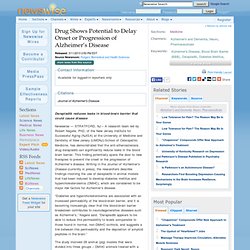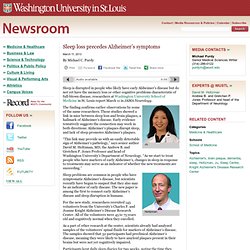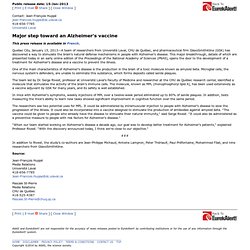

Drug Shows Potential to Delay Onset or Progression of Alzheimer’s Disease. Darapladib reduces leaks in blood-brain barrier that could cause disease Newswise — STRATFORD, NJ – A research team led by Robert Nagele, PhD, of the New Jersey Institute for Successful Aging (NJISA) at the University of Medicine and Dentistry of New Jersey (UMDNJ)-School of Osteopathic Medicine, has demonstrated that the anti-atherosclerosis drug darapladib can significantly reduce leaks in the blood brain barrier.

This finding potentially opens the door to new therapies to prevent the onset or the progression of Alzheimer’s disease. Sleep loss precedes Alzheimer's symptoms. Sleep is disrupted in people who likely have early Alzheimer’s disease but do not yet have the memory loss or other cognitive problems characteristic of full-blown disease, researchers at Washington University School of Medicine in St.

Louis report March 11 in JAMA Neurology. Ju The finding confirms earlier observations by some of the same researchers. Those studies showed a link in mice between sleep loss and brain plaques, a hallmark of Alzheimer’s disease. Early evidence tentatively suggests the connection may work in both directions: Alzheimer’s plaques disrupt sleep, and lack of sleep promotes Alzheimer’s plaques. Major step toward an Alzheimer's vaccine.
Public release date: 15-Jan-2013 [ Print | E-mail Share ] [ Close Window ] Contact: Jean-François Huppéjean-francois.huppe@dc.ulaval.ca 418-656-7785Université Laval This press release is available in French.

Quebec City, January 15, 2013—A team of researchers from Université Laval, CHU de Québec, and pharmaceutical firm GlaxoSmithKline (GSK) has discovered a way to stimulate the brain's natural defense mechanisms in people with Alzheimer's disease. This major breakthrough, details of which are presented today in an early online edition of the Proceedings of the National Academy of Sciences (PNAS), opens the door to the development of a treatment for Alzheimer's disease and a vaccine to prevent the illness.